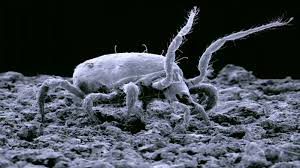Bugs are creepy and disgusting. All those legs, the wriggling antennae, the shiny, hard exoskeletons! They seem so alien, it’s no wonder we find them psychologically disturbing. I still remember one time in grade school when my classmates and I were shown a slide of the microscopic bacteria living on our skin. We were immediately repulsed, and erupted in a loud chorus of “Ewww!”
At that time, there wasn’t the slightest inkling that these strange creatures could be important for our health. Yet recent studies now confirm that early exposure to bacteria is critical for a strong immune system. Children who live in more sanitary, modern conditions with less exposure to dirt and germs have a greater chance of developing allergies, asthma, and a raft of auto-immune diseases, as well as obesity and even autism.
Ever since Louis Pasteur discovered that microscopic organisms were the cause of many deadly infections, we’ve been increasingly obsessed with cleanliness. We’ve spent the last century and a half scrupulously avoiding the microbes in impure water and unpasteurized milk, and it’s saved millions of lives. But science now tells us we may have gone too far.
Studies have shown that children who grow up on farms, with increased exposure to dirt, germs and animal feces, have a markedly smaller chance of developing asthma and allergies. Even owning a family dog helps. A Swedish study conducted in 2013 even found that children whose mothers sucked their pacifiers clean with their own saliva, rather than sterilizing it, had a lower risk of developing eczema. Another study published in the journal of Occupational and Environmental Health showed that children exposed to bleach have a 20% higher chance of coming down with the flu, and have more infections than those who are not.
The timing of this increased exposure to bacteria also seems to be important. Moving to a farm as an adult won’t do much to improve your asthma and allergy symptoms. However, growing up on a farm, or with a family dog, can go a long way towards preventing these same health problems later as a teenager or as an adult.
It’s time to reassess our notion of cleanliness, and widen it to include some exposure to germs. While it’s still important to drink clean water and wash our fruits and vegetables carefully before we eat them, it’s not necessary to sanitize everything. Our bodies require a diverse collection of microbes to properly stimulate our immune systems, and ensure the health of our gut. Bugs and other microorganisms may appear creepy and disgusting, but it turns out our bodies just aren’t as robust without them.
About the Author: Rebecca Wong has a BA in English Literature from the University of Waterloo and has been working in the herbal business since 2000. She studied at the Ontario College of Traditional Chinese Medicine under respected authorities Paul Des Rosiers and Vu Le, and graduated from the East West School of Planetary Herbology under Michael Tierra. She received training as a yoga teacher at The Branches in Kitchener/Waterloo, and therapeutic yoga teacher training from the School for Somatic Soulwork under Deniz Aydoslu. She now teaches yoga for anxiety, depression and burnout at Rebecca's Restful Yoga Studio in Toronto.
